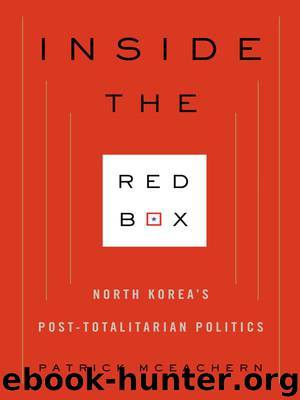Inside the Red Box by Patrick McEachern

Author:Patrick McEachern
Language: eng
Format: mobi
Tags: History/Asia/General
Publisher: Columbia University Press
Published: 2011-10-02T20:00:00+00:00
Regime Change Short List Concern Closes Ranks
U.S.-DPRK relations deteriorated after 9/11, and Pyongyang responded to the new environment. In a December 1 speech in Asia, President Bush warned Iraq and North Korea that they would be “held accountable” if they developed weapons of mass destruction, and the January 29, 2002, State of the Union Address grouped Iran, Iraq, and North Korea together as an “axis of evil.” The Foreign Ministry rejected Bush’s “slanderous remarks,” and an unattributed North Korean radio address focused on the U.S. military alert on the peninsula and repeated comments previously made by KPA officials, “We simply cannot casually overlook the violent remarks coming out of Bush’s mouth.” Pyongyang appeared to be united in opposition to the U.S. stand. Subsequent articles worried that U.S. regime change efforts would first concentrate on Iraq and move next to North Korea or Iran.
Two weeks after the State of the Union address, President Bush traveled to Seoul to meet with Kim Dae Jung. Bush told reporters that he remained open to negotiations with North Korea, but Kim Jong Il had failed to call him. Bush followed up by noting, “Yet I will remind the world that America will not allow North Korea and other dangerous regimes to threaten freedom with weapons of mass destruction.”29 He reiterated in Seoul that the United States had no intention of attacking North Korea and voiced support for the South’s sunshine policy. He also questioned the character of his North Korean counterpart and voiced concern about human rights, North Korea’s forward deployed conventional forces on the DMZ, and nuclear and missile issues. While the Clinton administration’s goals had narrowed, Bush’s goals vis-à-vis Pyongyang at the outset of his administration were more comprehensive. For a political establishment in Pyongyang concerned about U.S. intentions to force regime change, Bush’s more comprehensive efforts to affect all of these issues simultaneously seemed to require a change at the source of each of these problems: the North Korean regime itself.
North Korean elites of all stripes took little stock in U.S. assurances that it had no intention of invading. KCNA cited Bush’s “slander[ing] its political system” to sharply reject the U.S. offer to negotiate under these circumstances.30 Party commentaries increasingly commented on individual foreign policy issues as the Foreign Ministry remained silent. Party commentaries cited U.S. officials’ remarks in the following weeks—including issues as diverse as NPT commitments, nuclear weapons developments, human rights and religious freedom stances, and continued missile defense cooperation with Japan—as further evidence that the United States planned to “suffocate” and then invade the North.31 The party spoke out against the Pentagon’s unveiling a new nuclear policy document that recommended developing a nuclear weapon to target North Korea, Iran, Iraq, Libya, and Syria.
Despite the party’s objection, the Foreign Ministry kept its meetings two days later in New York with U.S. negotiators. The New York talks did not immediately yield a commitment for higher level negotiations, but Pyongyang agreed to continue monthly technical meetings related to building the Light Water Reactor promised under the Agreed Framework.
Download
This site does not store any files on its server. We only index and link to content provided by other sites. Please contact the content providers to delete copyright contents if any and email us, we'll remove relevant links or contents immediately.
| Anthropology | Archaeology |
| Philosophy | Politics & Government |
| Social Sciences | Sociology |
| Women's Studies |
The Secret History by Donna Tartt(19005)
The Social Justice Warrior Handbook by Lisa De Pasquale(12178)
Thirteen Reasons Why by Jay Asher(8874)
This Is How You Lose Her by Junot Diaz(6859)
Weapons of Math Destruction by Cathy O'Neil(6251)
Zero to One by Peter Thiel(5770)
Beartown by Fredrik Backman(5719)
The Myth of the Strong Leader by Archie Brown(5482)
The Fire Next Time by James Baldwin(5413)
How Democracies Die by Steven Levitsky & Daniel Ziblatt(5200)
Promise Me, Dad by Joe Biden(5132)
Stone's Rules by Roger Stone(5066)
A Higher Loyalty: Truth, Lies, and Leadership by James Comey(4941)
100 Deadly Skills by Clint Emerson(4901)
Rise and Kill First by Ronen Bergman(4764)
Secrecy World by Jake Bernstein(4729)
The David Icke Guide to the Global Conspiracy (and how to end it) by David Icke(4687)
The Farm by Tom Rob Smith(4490)
The Doomsday Machine by Daniel Ellsberg(4475)
